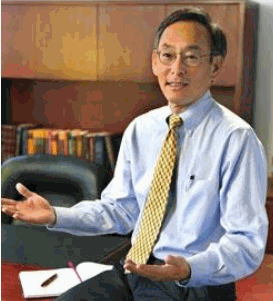
|
|
|
|
|
|
|
News & Views item - August 2009 |
![]() Steven Chu Doesn't Go to Washington and Pays a Price.
(August 14, 2009)
Steven Chu Doesn't Go to Washington and Pays a Price.
(August 14, 2009)
President Obama's driving Secretary of Energy, Nobel Laureate Steven Chu got a lesson in Washingtonian etiquette the other day as he explained to the 21 members of the President Council of Advisors on Science and Technology (PCAST) when he accepted their invitation (along with other of President Obama's administration officials) to chat about matters of common interest.
Dr Chu, whose research at Bell Labs earned him the 1997 Nobel Physics Prize together with Claude Cohen-Tannoudji and William Phillips "for development of methods to cool and trap atoms with laser light", had his request for US$288 million to set up "eight break-the-mold energy-research centers" modelled on Bell Labs pared down to three by the US Senate and one in the House of Representatives.
"Congress asked the people below me, and they didn't know what I was thinking," Chu told PCAST members. "I didn't take the time to explain it personally to each member. That's the way it works around here. And I've learned that." In short Dr Chu was being given a lesson on just "who runs things around here".
As he explained to the members of PCAST according to Science's Jeffrey Mervis he wants "to emulate the old phone monopoly's wildly productive approach to supporting basic research. The idea is to identify an important problem and then work relentlessly at finding a solution, testing a multitude of ideas until one succeeds. In contrast, he says, most scientists funded by federal research agencies are told 'you've got 3 years to get refunded, so that's how you work.' The result, he says, is too often incremental progress on low-risk ideas".
But Dr Chu had considerably more to impart to PCAST. He identifies the difficulty of evaluating and then expanding programs in science-education ("How do you analyze what works? And how exportable is it?"), and overcoming the barriers to industrial innovation ("Wall Street often punishes a company for deciding to invest in research") as two fundamental problems for the Obama Administration.
He then got stuck into the US Department of Defence saying that during the past 2 decades, it had progressively reduced funding high-risk, high-payoff ideas. He also had a shot at federal biomedical research funding noting a lack of sufficient support for applications from PIs in the physical sciences. "I think they're afraid some computer scientist might take money from a biologist". And pointed out that PCAST co-chair, Harold Varmus, when Director of the NIH during the Clinton Administration had pushed to expand such interdisciplinary research.
Dr Chu also requested some direct assistance from the council. For example would they assess the strengths and weaknesses of the Department of Energy (DOE) which has a current budget of US$24-billion-a-year budget topped up with US$39 billion in one-time stimulus money*. DOE has been charged with leading in meeting President Obama's promises to reduce carbon emissions, the country's dependence on foreign oil, and promoting sustainable energy. He said: "[DOE's] Office of Science is as good as NSF [in supporting basic research], I think, but I have some questions about the applied areas. I need some ammunition from you guys, ... because we're spending billions of dollars [on scaling up research with commercial potential]. I'd love for PCAST to look at what we're doing [in this area]."
__________________
*That's a total of about 7% of Australia's annual GDP.